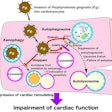
Periodontitis is associated with a higher risk for cardiovascular disease, and the risk increases for those with more severe gum disease, according to research being presented this week at the European Society of Cardiology (ESC) virtual meeting.
In a long-term follow-up of a previous study that found periodontitis to be significantly more common in first-time heart attack patients compared with healthy peers, researchers from the Karolinska Institute in Stockholm reported that patients with periodontitis had a higher risk of a cardiovascular event over time. This elevated risk, which increased in parallel with periodontitis severity, was particularly apparent in patients who had already experienced a heart attack.
"Our study suggests that dental screening programmes including regular check-ups and education on proper dental hygiene may help to prevent first and subsequent heart events," said lead author Dr. Giulia Ferrannini in a statement.
The study included 1,587 participants with an average age of 62. Of these, 985 were classified as healthy on a dental examination between 2010 and 2014, while 489 had moderate periodontitis and 113 had severe periodontitis.
The researchers then followed up all participants for the occurrence of cardiovascular events and death, collecting follow-up data from Swedish national death and patient registries until the end of 2018. Over the average follow-up of 6.2 years, there were 205 primary end-point events -- all-cause death, nonfatal heart attack or stroke, or severe heart failure.
Those participants with periodontitis at baseline had 49% higher odds of the primary end point compared to those with healthy gums, according to the researchers. What's more, the probability rose with the increasing severity of gum disease.
The researchers postulated that the damage of periodontal tissues in people with gum disease may facilitate the transfer of germs into the bloodstream.
"This could accelerate harmful changes to the blood vessels and/or enhance systemic inflammation that is harmful to the vessels," Ferrannini said.



















